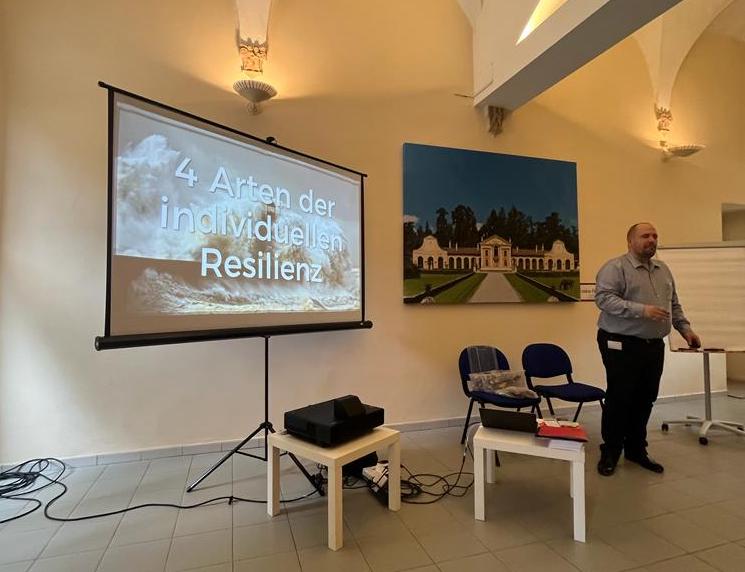
Advancing AI Integration at UNIQA: A Future Focus
Advancing AI Integration at UNIQA: A Future Focus
Do you prefer to listen to this article? Click below to access our AI-generated version of this blog article!
Advancing AI Integration at UNIQA: A Future Focus
Iris Brachmaier, Group Chief People Officer of UNIQA Insurance Group AG since August 2023 and therefore responsible for international HR, provides insights into the company’s groundbreaking transformation up to 2025 in an interview with our colleague Melanie Holzner. The focus is on the vision of using artificial intelligence (AI) not only to become the most attractive employer in the industry but also to revolutionize the employee experience. The planned talent intelligence platform, powered entirely by AI, will unite all HR standards and processes and innovatively redesign employee development, talent management, and recruiting.
Interface Between Person and Machine
The interview highlights not only the technological aspects but also the ethical and data protection-compliant measures that UNIQA is taking in this AI-driven future. Melanie learned from Iris Brachmaier how UNIQA shapes the interface between person and machine and ensures that employees are at the center of this HR innovation.
How is UNIQA Dealing with the Opportunities and Challenges of Artificial Intelligence (AI)?
We want to become the most attractive employer in our industry by 2025. To achieve this goal, we must also be able to offer the appropriate employee experience throughout the Group. We have therefore identified areas for action: we want to support employees in their career planning and career steps, provide feedback and performance management frameworks, and create a learning experience offering. At the same time, we are investing heavily in people and talent development. The people processes are being revised internationally and standardized. All standards and processes are to be mapped in systems.
The Talent Intelligence Platform
These systems will be combined in a so-called Talent Intelligence Platform, which is 100% powered by AI. This means that UNIQA employees are offered a platform with the vision that they can, for example, develop from claims handler to HR expert.
So you join the platform. It knows exactly who you are and what skills you have from LinkedIn profiles, CVs, or other information in the company. The artificial intelligence compares your current skills with those required for your future role and automatically recognizes where the gap is.
Appropriate development measures are required to close this gap. Possible and suitable measures are then drawn from the Learning Management System by the Talent Intelligence Platform. Training, mentoring, or coaching is also suggested for employees who want to advance their careers.

AI-driven talent management and recruiting
At the same time, we integrate the feedback and target-setting process as well as recruiting into this platform. We not only focus on the employee experience but also the candidate experience, because we want to bring the right employees into the company at the right time. The entire topic of talent acquisition and onboarding is therefore managed very automatically via AI. It starts with job descriptions being created via the system: You can arrange interviews automatically through artificial intelligence. It also provides the interview documents.
Our vision
We may even go so far that the first interview is no longer conducted by recruiters themselves, but is controlled by the platform. There will then be a human touch in the personal touchpoints. That is our vision, and we will have implemented it in the next two years. This certainly means a completely different way of working for the HR function, because a lot of things are fully automated. At the same time, however, it also allows the function to concentrate on the really important tasks, as many administrative tasks are automated.
The human side
It is also about emphasizing the human side: There needs to be a balanced relationship between person and machine, with the human always being at the forefront and the one who can positively influence the view, sensitivity, and employee experience. The tools and artificial intelligence are a support for us to have the capacity to take intensive care of our employees.
Have measures been taken so far to prepare employees for the use of AI and to ensure that they accept these technologies?
There is an accompanying comprehensive change management and transformation program. These processes and tools are being developed and selected across all our teams and functions. We have a communication plan in which we communicate a lot so that all employees in the HR function know what to expect. Nevertheless, it’s human nature to ask what this means for you personally when faced with such a big change.
A whole new IT landscape
There is certainly a lot of uncertainty, as the leap is huge. We are moving from a very basic IT landscape to something completely new and modern, skipping some steps that other companies may have already taken. This transformation is therefore accompanied by a dedicated project stream that is exclusively concerned with ensuring that employees are on board. Everyone should know what we are doing, they should be involved in the projects, select the systems, and experience first-hand what this new world can look like. We have change ambassadors, sounding boards, and many other ways for employees to provide anonymous feedback. Personally, it is also important to me to pick up the employees and be close to them so as not to create excessive demands and uncertainty.

Is UNIQA taking measures to act ethically and in compliance with data protection regulations?
Yes, absolutely, we are already doing that. We are one hundred percent GDPR-compliant, and when selecting these systems, we check together with our data protection officers, Legal, Compliance, and, of course, IT Security how the data is processed, where it is stored, and what happens to the data.
We ensure that there are deletion routines for applicant data, as it is stipulated that this data may not be stored indefinitely, although such platforms generally offer this option. We analyze where the data is processed and whether this takes place within Europe. This is a key criterion when selecting such platforms.
What is UNIQA’s general attitude towards AI? How open is the corporate culture to the use of AI?
We are experimenting in various areas, and our IT department ultimately set up a so-called Center of Excellence team that deals with the use of artificial intelligence in the company. The topic of customer service is now also strongly driven by AI in our business model. We use chatbots to process claims and customer inquiries, which is now highly automated and involves a lot of artificial intelligence.
However, even in the larger corporate context, this is a step-by-step preparation of our employees for this changing world and changing way of working, including in our core business functions. This is another part of the HR function to accompany this business transformation. Just as we are doing for HR employees, this is also happening for employees in other parts of the company.
On the road to the future: AI integration and employee development at UNIQA
The culture is undergoing a development process, and we have our own Culture Office that is working intensively to ensure that these new approaches are also incorporated into the corporate culture. It is important to us that people are always at the forefront, as I said earlier: People, machines, and interaction are important, but ultimately people come before machines. This is also anchored in our corporate culture, which is why we are determined to involve all of our employees accordingly and take them along with us.
The common path with our employees
Within the company, we have identified which future skills we need, and these are the ones we currently have across various job families. We believe that we can deliver 85-90% of future skills through training. This means that we will simply develop our employees and take them on the journey. So there is not such a great need to hire new employees externally. This is also a statement to our employees – that we are happy to have them and are absolutely convinced that we can go this way together with them. We do everything we can to ensure that they develop the necessary skills.
Conclusion – a living promise for a promising future
UNIQA’s ambitious steps towards an AI-driven HR future not only demonstrate a pioneering technological spirit, but also a clear commitment to employees. The company’s emphasized openness to change, ethical conduct and active involvement through comprehensive change management make it clear that UNIQA is not only pointing the way to the future, but also ensuring that all employees can help shape this path.
In this transformation process, UNIQA is not only proving to be a pioneer in AI-based innovation, but also an advocate of a working world in which the strengths of person and machine are in harmony – a vivid promise for a promising future.

Iris Brachmaier
Group Chief People Officer of UNIQA Insurance Group
Iris Brachmaier has been Group Chief People Officer of the UNIQA Group since August 1, 2023. She is responsible for Group HR, Culture, Diversity & Inclusion in 18 countries. Before joining UNIQA, Iris Brachmaier held various top management positions in the Automotive, Paper & Packaging and IT sectors. As Vice President Corporate Development & Group HR at the global GG Group, she was responsible for strategy, ESG, organizational development and HR.
Her current focus is on the development and implementation of people strategy, digital transformation and organizational design as well as employee experience and leadership effectiveness.

Melanie Holzner
Junior L&D Consultant
Melanie started at MDI in 2021 as a project manager and supported clients in organizing leadership trainings. Since the beginning of 2023, she has been working as a Junior Learning & Development Consultant and designs tailor-made, sustainable training programs for her clients. Melanie attaches great importance to the highest quality and continuously strives to make a sustainable contribution to the development of leaders and thus to an improved world.
Since joining MDI, UNIQA Insurance Group AG has been one of her long-standing clients. In an interview with international HR leader Iris Brachmaier, she discusses the use of AI in HR at UNIQA.

















